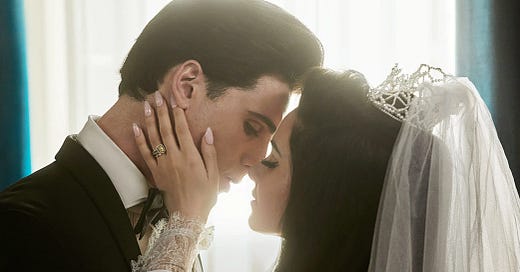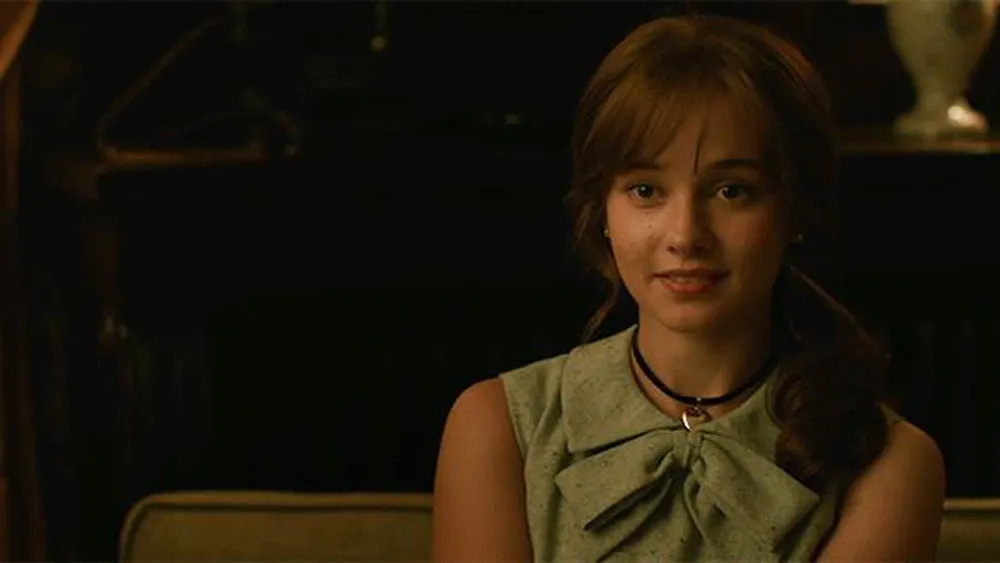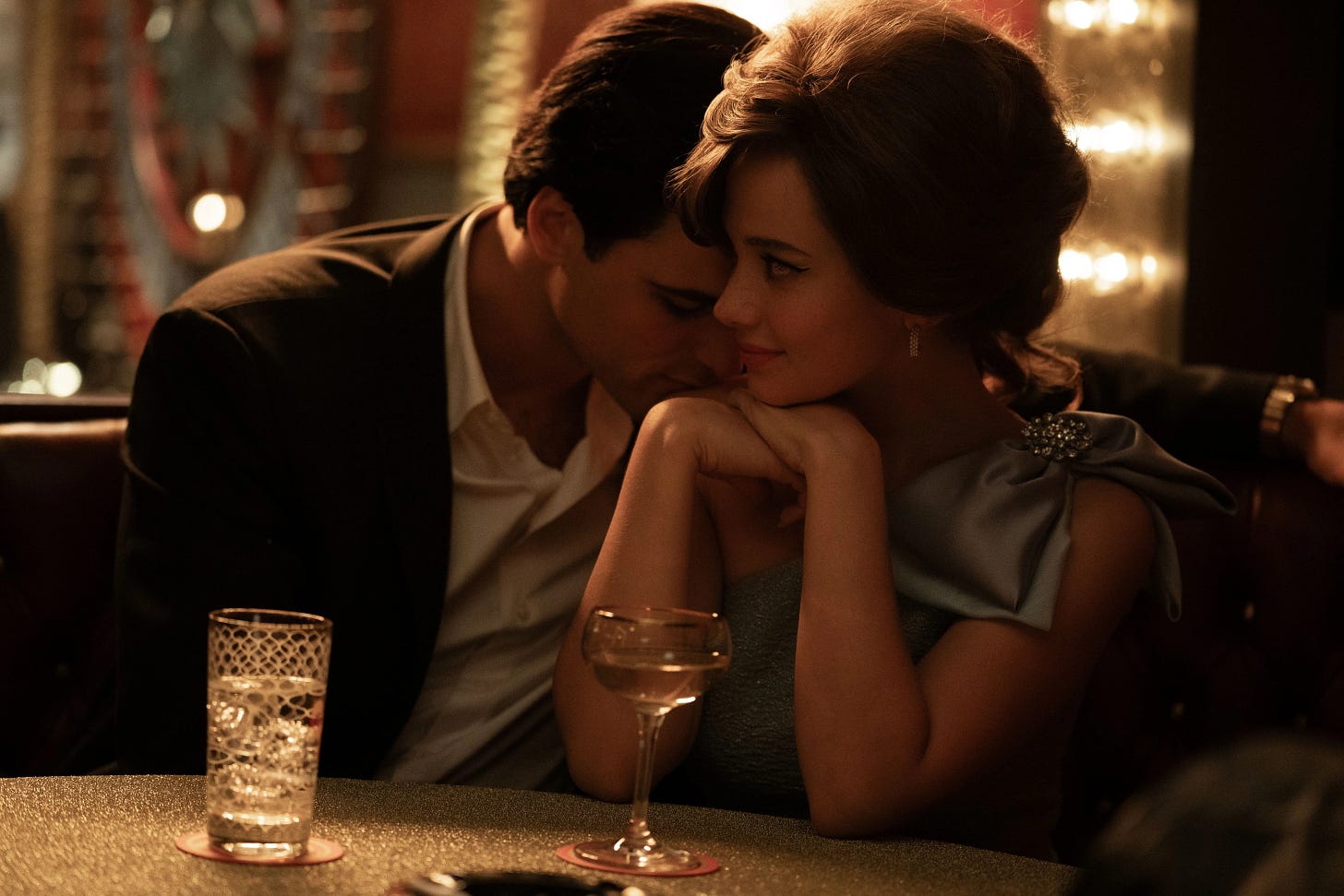Review - Priscilla (+ Golden Globes)
Girl meets boy. Girl moves to his majestic home. Boy neglects girl. Girl feels isolated. Plus: a brief breakdown of the last night's Golden Globe Awards.
Last weekend marked the first time that Mubi ever distributed one of its films in Venezuelan theaters. This is such good news! Let’s hope that they are successful and decide to distribute more films here -I would’ve loved to see Fallen Leaves in the big screen, for example-.
That being said, it made complete sense that Priscilla would be their first film in their bigger Latin American expansion. Sofia Coppola is highly regarded in popular culture and the subject matter is very much of the public interest to say the least. Cailee Spaeny won the best actress prize at the Venice Film Festival for her performance here, and even though she probably will not get an Oscar nomination, the hype is real.
Be warned, this review spoils the film. If you know nothing about Elvis’ marriage to Priscilla or wish to go in blind, I suggest you read this after watching. But again, this is a real life case so maybe you already know everything that happens as I did when I watched it.
Within and Beyond Graceland: Sofia Coppola’s Priscilla
Production from the United States. Released in 2023.
In 2022 we got Baz Luhrmann’s Elvis, which felt like an excuse to have an Elvis lookalike to sing the classics of his time, had nothing interesting to say and lacked an appealing visual style -I personally do not like Luhrmann’s over the top aesthetic-. Apart from that, it seemed to cast the blame for everything that went wrong with Elvis’ life on his manager. Very rich coming from a project directly approved by the Elvis estate, interested in still making money off of his legacy. It was a relief to know a few months after that Sofia Coppola had already shot a film documenting Priscilla Presley’s marriage to Elvis, from her perspective entirely. It is not without its flaws but it overall was an enjoyable experience, a lot better than Elvis and filled with complexities and an actual voice with things to say.
Knowing that there are two films that tackle similar subjects, what justifies Priscilla’s existence beyond being another point of view? While Elvis used the Priscilla character as a supportive figure who understood her role but was unable to bear it as Elvis succumbed to his vices in his later life, Coppola’s film frames it through an entirely different lens, about a man who never understood marriage as a true partnership, and about a girl who was swept up and did not have the tools nor the emotional maturity to understand that she was very unhappy and had a better life ahead of her.
Coppola’s view was that Elvis wanted someone to be completely dedicated to him. He wouldn’t let her get a part-time job because he needed her to be home when he called. She was forced to tolerate his infidelity because he needed a woman who could understand that those things might happen. He refused for some time to be physically intimate with her because he appreciated her virginal innocence more than he loved her as a person, while she had her needs completely unmet. He balked at her when she hated his spiritual/LSD phase, but when his manager told him to stop, he complied. All of that and more showed that they were never a partnership, not really, she was just his property, and it was only when she had a taste of what her life could be like that she realized that she could have a lot better, and could build the strength to leave him.
Most of what makes this work hinges on the performances of Cailee Spaeny and Jacob Elordi as the central couple. Both get moments of outbursts and capital A acting for sure, especially in the discoveries of infidelity, but as with most Sofia Coppola films, the best moments are when they are quiet, contemplative, with their expressions doing most of the heavy lifting. Spaeny’s innocence shown in the first minutes of the film are drained out, and in the marriage sequence, she is beautiful but looks very troubled, as if she knows that it will not end well for her. Elordi also shows a very different side of Elvis, a very charismatic portrayal but also of someone very troubled with what his faith brought him and without the tools necessary to handle his fear, rage and sadness without hurting Priscilla. He is very emotionally manipulative but it almost seems like it is in spite of himself, like he doesn’t know any better. Elvis is never justified but it is definitely a more complex portrait.
Coppola’s style is also just as adequate for this project. She follows the lineage of directors who like to work in dollhouse structures, all inspired of course by the great Yasujiro Ozu. Graceland here is as beautiful as you may imagine, with the pastels serving as a contrast to the flashiness that surrounds Elvis outside. Her full shots of the interior spaces are great, but the best shots are inserts and extreme close-ups, of feet getting a pedicure, Priscilla putting on her makeup, making her hair, putting on accessories, being handed gifts like records and rings. It fits the theme pretty well because it shows her for what others viewed her as: a pretty trophy for her husband to have and behold.
My biggest conflict with the film lies in its pacing. Priscilla’s eventual falling out of love with Elvis feels organic, especially with Spaeny’s acting as her reactions to Elvis’ behavior did most of the heavy lifting, but the time Coppola decided to spend with their marriage was very uneven. The first half hour was adequate in spending the time in Germany, especially to serve as a comparison for Priscilla as a child to later on as a fully grown woman. But then a lot of time is spent in Graceland before their marriage (1963 to 1967), where the viewer gets to witness most of the manipulative and emotionally abusive acts that existed within the marriage.
When they finally get married, which could’ve been the most interesting time as she had the maturity to recognize the wrongs and be more assertive, the film moves very quickly to its ultimate conclusion as she decides to leave him in that hotel room in Las Vegas. Before that, she just looks at him differently and very quickly. And when she begins to have a life to call her own, the film moves through it like a montage. Of course, it makes sense to want to focus on the girl-in-house aesthetic, as it plays to Coppola’s strengths shown in Marie Antoinette, Somewhere and to some extent even in Lost in Translation, even as its scope is larger and the style more akin to Wong Kar-wai than Ozu. Still, the slow buildup of Priscilla’s suffocation under Graceland would have benefited from a transcendent release of being in the outside environment and thriving.
Ultimately, Priscilla serves as a return to form for Sofia Coppola, playing to her strengths in a story that was practically begging for her treatment, without oversimplifying the message nor playing to groupthink mentalities. She approached the subject matter with the delicacy that characterizes her to tell the story of a woman defined by her marriage who eventually comes to understand how dehumanizing it is to live that way. Even though she chose to spend unequal amounts of time in certain moments of her life, leading to an uneven pacing and rapid movements in times that needed to be mined for more, Graceland was still a good place to be, and eventually to want to leave from.
Extra: The Golden Globes
Awards season officially kicked off last night with the Golden Globe awards, which provided a nice change of pace as it recognized more international films in its roster of nominations, including one of my personal favorites: Anatomy of a Fall.
While I do not believe in the legitimacy of these awards and their indication of what is considered the ‘best’, there is always reason to celebrate when actually good films get the recognition they deserve by industry leaders and professionals alike. So my attitude towards award shows is one of measured ambivalence but happiness when the good things win.
With that being said, here is a very brief overview:
Oppenheimer was the big winner of the night, taking home five Golden Globes including best motion picture (drama), best director for Christopher Nolan, best actor (drama) for Cillian Murphy, best supporting actor for Robert Downey Jr. and best original score. Even though it is not my favorite, I’m happy that a genuinely good blockbuster is getting the awards and it may go all the way, though I don’t know if frontrunner fatigue could slow it down in the months to come.
Nolan and Murphy are looking safe to win their Oscars, but I have the feeling that Downey Jr. has some tight competition in the coming weeks. Ryan Gosling and Charles Melton also have the strength and narrative to go all the way. Let’s see if this category becomes the most competitive.
Poor Things also made a fairly good showing beating out Barbie in the competition, as it won best motion picture (comedy or musical) and best actress (comedy) for Emma Stone. I’ll get a chance to see it in a couple of weeks, so I’ll publish my review then.
Anatomy of a Fall made a great showing winning best screenplay and best foreign language film. I was kind of hoping that Sandra Hüller would also win best actress (drama) but that is an uphill battle with most of the support being thrown towards Lily Gladstone.
Lily Gladstone won best actress (drama) for Killers of the Flower Moon, the only award for the film. This category is also very competitive and she’ll continue to duke it out with Emma Stone for the Oscar in the next awards, let’s see how it shapes out.
In a perfect world, ‘Killers’ or Anatomy of a Fall would win over Oppenheimer, but I’m not mad that the latter is getting the awards. All of these options are good options.
The Holdovers won best actor (comedy) for Paul Giamatti and best supporting actress for Da’Vine Joy Randolph. She will definitely win all of the awards and Giamatti could be a dark horse against Murphy, but I’m not feeling too sure. I guess I’m in the minority with not liking this film, everyone else seems to love it.
Despite being the most nominated film of the night, Barbie only won two awards: the laughable ‘cinematic and box office achievement award’ and best original song for Billie Eilish’s What Was I Made For? which is the best out of that crop of songs.
In a surprising turn, Hayao Miyazaki’s The Boy and the Heron was awarded best animated film over Spider-Man: Across the Spider-Verse. I haven’t gotten the chance to see Miyazaki’s film yet, I’m hoping it gets released on VOD soon, but this could turn the tides around for other industry voters interested in watching the Japanese master’s latest film.
Going home empty handed are May December (sad), Past Lives, Maestro, The Zone of Interest, American Fiction and Air.
The Critics Choice Awards are next week and in two weeks the Academy will announce the Oscar nominations. I’ll make more breakdowns like these for those and the rest that I feel are relevant.







